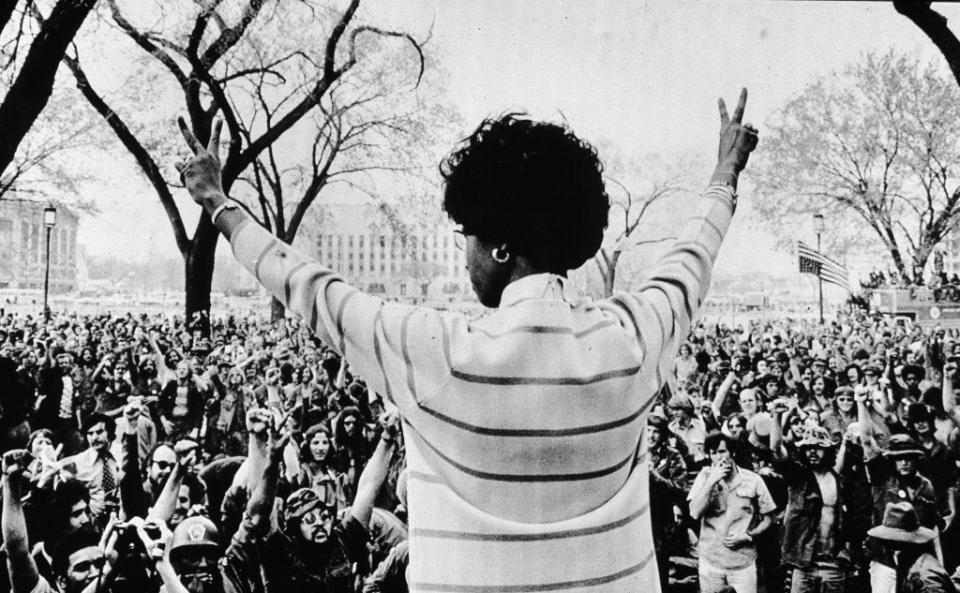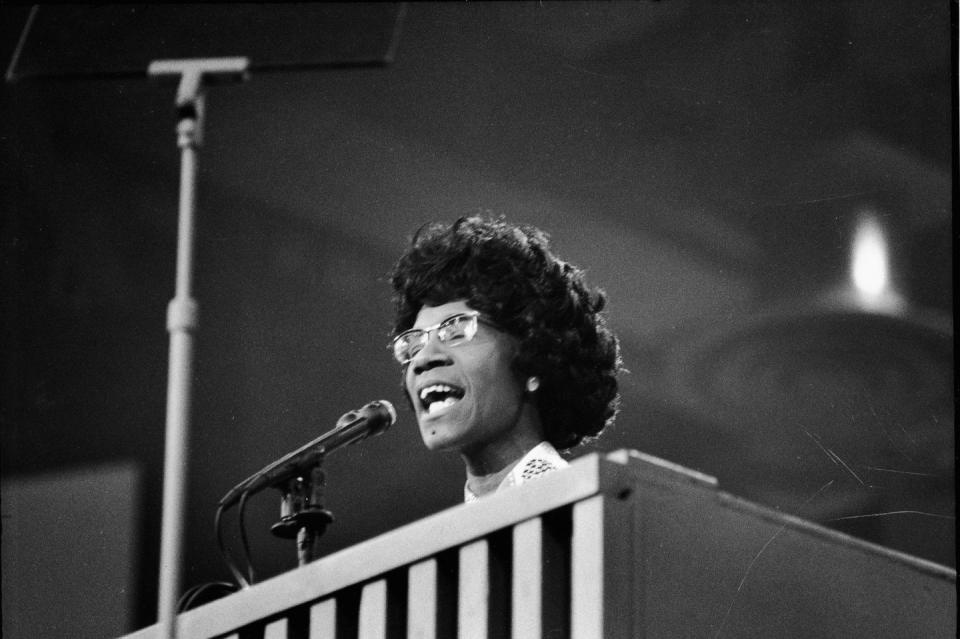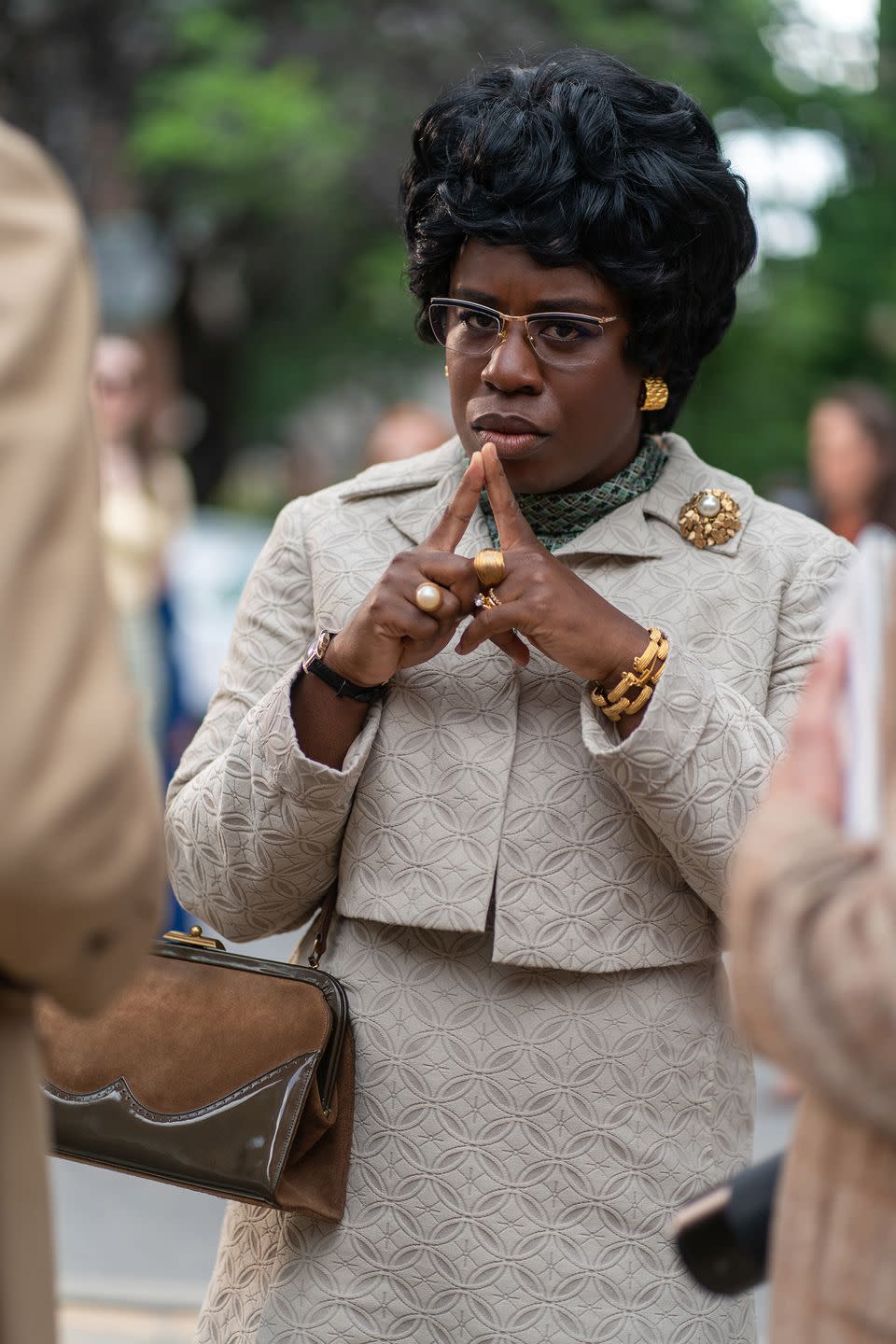The True Story Behind Shirley Chisholm's Trailblazing 1972 Presidential Run

When Senator Kamala Harris announced her presidential run in January 2019, she evoked the name and legacy of the very first black woman ever to do so. On January 25, 1972, Democratic congresswoman Shirley Chisholm announced that she was running for president, becoming both the first black candidate and the first woman to seek the presidential nomination for a major political party.

More than four decades later, Harris timed her own announcement to coincide with this anniversary and borrowed Chisholm's signature color scheme for her campaign. “Shirley Chisholm’s activism, advocacy, and willingness to persistently remind the nation of the work to be done on behalf of its people is an enduring legacy that lives on in the Senator and to honor that legacy in her own campaign for president was a no-brainer,” a Harris campaign spokeswoman told The Guardian.
Chisholm’s story is brought to life in FX on Hulu's miniseries Mrs. America, which focuses on a critical moment in the 1970s feminist movement, as activists on the left—including Gloria Steinem (Rose Byrne) and Betty Friedan (Tracey Ullman)—fought to pass the Equal Rights Amendment. On the right, activists led by Phyllis Schlafly (Cate Blanchett), the "first lady of the Conservative movement," fought just as hard to destroy it.
Chisholm was a political pioneer who earned the moniker "Fighting Shirley" for her commitment to working for marginalized groups in Congress. "She was such a trailblazer for all women because she stood for possibility," Aduba told reporters last week. "The idea that what the world tells you is possible for yourself versus what you know to be possible for yourself—that was the guiding light for me when I was working on this role."
Below, a primer on Chisholm and her groundbreaking run for president.

Chisholm was the first black woman elected to Congress.
Even before her historic presidential run, Chisholm had broken major ground for women of color in politics. She started her career as a teacher, serving as director for the Hamilton-Madison Child Care Center and later as an educational consultant for New York City's Bureau of Child Welfare. In 1964, she was elected to the New York State Assembly, where she served two terms.
In 1968, Chisholm ran for the House of Representatives from New York's 12th congressional district, which largely consisted of her home neighborhood of Bedford-Stuyvesant in Brooklyn. According to NPR, her contest against Republican opponent James Farmer, who was also black, drew very little attention except in the local press, which disappointed Chisholm.
"My dear friends, tonight is a very important night," she told supporters on the night of her victory. "Not so much for me, but for you, the people of this community. After many years of struggle and sacrifices on the part of several of you here this evening, we have at long last been able to elect today a voice that shall be your voice in the halls of the United States Congress." She served a total of seven terms in Congress.
Chisholm was an outspoken pioneer who refused to toe the political line.
Unafraid to make enemies in the name of doing the right thing, Chisholm quickly established herself in the House as a maverick. "I have no intention of just sitting quietly and observing," she said early in her tenure. "I intend to focus attention on the nation's problems." She spoke out against the Vietnam War in her first floor speech in March of 1969, vowing to vote against any defense appropriation bill "until the time comes when our values and priorities have been turned right-side up again." She was a vocal opponent of the draft, and championed education and employment opportunities for marginalized communities throughout her time in Congress.
Chisholm's 1972 presidential run changed the playing field forever.
“I am not the candidate of black America, although I am black and proud," Chisholm said as she announced her historic run for the White House in January of 1972. "I am not the candidate of the woman's movement of this country, although I am a woman and I am equally proud of that.” Chisholm's bid was ambitious–she was challenging a number of fellow Democrats, all of them white men, including George McGovern (the eventual nominee), Hubert Humphrey, Edmund Muskie, Henry M. Jackson, and George Wallace.
Despite the overwhelming odds against her, Chisholm campaigned on a platform that emphasized boldness, bravery, and a refusal to bend to political norms. "Unbought and Unbossed" was her campaign slogan, and though she only garnered 152 delegate votes at the Democratic National Convention that year, her message paved the way for many candidates after her.
As depicted in Mrs. America, Chisholm was not able to consolidate support even among the feminist movement. "Feminists were split over her candidacy,” Robert Gottlieb, who worked on Chisholm's campaign, told Smithsonian magazine. "Gloria Steinem, who you would expect to have supported her, supported McGovern instead. That was significant and it hurt on a personal level quite a bit." (Steinem has denied that she "abandoned" Chisholm, pointing out in a 2019 New York Times op-ed that she ran as a pledged delegate for Chisholm's candidacy in New York).
Voters who favored Chisholm expressed concern that she wasn't electable—as one supporter in Tucson put it, "I would like to be able to afford a vote for Shirley Chisholm, but I can’t. I want someone who will beat Nixon.” Gottlieb also noted that Chisholm felt her gender was more of a barrier than her race: "People were not comfortable with having a black woman. And she often said, between being black and being a woman, the biggest problem was being a woman," he said.
"I think Shirley Chisholm was the first hope candidate," Aduba told reporters, discussing what she had learned while researching the role. "Everything she stood for and spoke about was possibility. What was interesting for me to explore was to find that strength that she obviously believed she possessed…This is a woman who was running when the Civil Rights Act has just been enacted, who's running four years after Martin Luther King has been assassinated. So, the climate that she's coming out of to hold space is one very different from the world we live in today…She carried a lot on her shoulders."

A statue of Chisholm will soon be unveiled in New York City
After her loss in 1972, Chisholm returned to Congress and served several more terms, ultimately becoming the Secretary of the House Democratic Caucus. She left Congress in 1983, having served on the Committee on Education and Labor and the Rules Committee, and was a founding member of both the Congressional Black Caucus in 1971, and the Congressional Women's Caucus in 1977.

In 2018, the fiftieth anniversary of her election to Congress, Chisholm's accomplishments were celebrated with a series of measures passed in New York to honor her legacy. A statue of Chisholm is set to be erected in Brooklyn's Prospect Park, making her (outrageously) the first female historical figure to have a public monument dedicated to her in Brooklyn. The design for the 40-f00t memorial statue was unveiled last year.
Also last year, New York Governor Andrew Cuomo announced a new exhibit focused on Chisholm's career and legacy, titled UNBOUGHT & UNBOSSED: A Tribute to Shirley Chisholm, which lives at the Shirley A. Chisholm State Office Building in Brooklyn. "Shirley Chisholm's signature campaign slogan 'unbought and unbossed' reminds us of her dedication to fight to defend the rights of women and black Americans, reform the country's education system and improve the lives of working people and those living in poverty," Cuomo said. "This exhibit celebrates the 50th anniversary of Shirley Chisholm's inaugural year representing her Brooklyn district as the first black woman elected to serve in Congress and honors her deep impact on politics that we still feel to this day."
You Might Also Like

